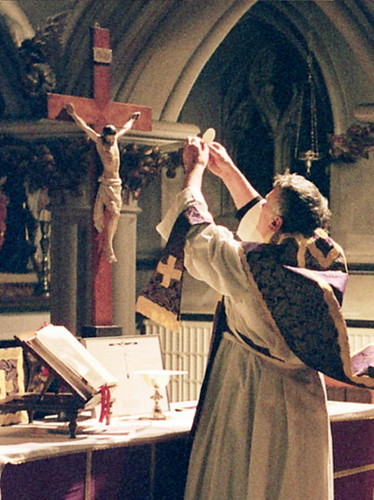
Fr Ray Blake of St Mary Magdalen's Church, Brighton
A good friend of mine, Henry, has written a good piece on the need for silence and awe in the Mass. Here is his post and click here to see his blog...
'Be still and know that I am God.' So go the words of a popular hymn, based on Psalm 46. However, stillness in the modern Catholic liturgy is more notable for its absence.
I have attended a variety of liturgies at different places in the past few months. At my local church we usually have a Novus Ordo mass with Latin chant. This is a dignified celebration and as good as it gets when most of the prayers are in English, which is always mildly irritating due to the bad translation and the kitschy "and also with you" response.
At the end of last year I was in Marlow one Sunday and went to mass there, in a nasty 1980s church with a bare brick interior, with unpleasant modern hymns which I had never heard before, sung by a small choir because nobody else present seemed to know them either. Then, in mid-January, I was in Salisbury, which the liturgy used to be quite reasonable but has been distinctly odd recently. On my previous trip, the music was 1970s, and the priest delivered his sermon whilst walking up and down the aisle, which was disconcerting. So I decided to give it a miss and went to an Extraordinary Form mass at Warminster, which involved a 45 minute bus ride each way on a cold evening. But it was worth it not to end up being annoyed.
In my own parish we had an Extraordinary Form sung mass on the Feast of the Presentation, and another, a Requiem for the Parish Priest's father, a few days later. There was plenty of silence at these.
On the Sunday we were promised a "children's mass". From past experience, these consist of jolly hymns with simple tunes, and a clapping Gloria, accompanied by recorded music played too loud on a bad public address system. Numinous it isn't. The readings are done by children, many of whom sound as if they don't know the meaning of the words they are saying - they are just mouthing the letters on the page. I end up feeling angry and avoid them these days, so I went with a friend to another parish.
My heart sank when I saw the list of hymns - banal 1970s tunes, accompanied by violinists and wind players, plus a guitar. It was a pity about the music because the strings and wind instruments actually produced a good sound, but the guitar, as usual was a disaster with a horrible and insistent chunger-chunger-chunger-chunger background.
Then off to Sweden, where the music tends to be old Swedish settings of Gregorian chant, and since the translation is reasonably true to the Latin, the liturgy is satisfactory in a functional sort of way and is never an obstacle to worship. So the next three weeks will be fine and presumably there will be no more children's liturgies for a while.
Following Vatican II, the official view on the language and music in the liturgy is as follows
This music is well within the abilities of the average nine-year-old child and one must ask why Catholic schools are not teaching it to their pupils so that they can participate in the singing at their Sunday parish masses. Why children need special children's masses is a question that needs to be asked. Making the liturgy childish means that religion becomes something to grow up out of. It could be one reason why young people stop going to church when they reach their teens.
The new English translation is coming soon and will be a faithful translation of the Latin. I wonder how it will go down. My first impression is that it sounds like seventeenth century English and will feel contrived. Some people might be put off by this. In any case, there is a problem with English - the moment someone opens their mouth, they are pigeonholed as regards their class and intelligence. This is a spin-off from the economic and social divisions which cut through British society. People are still judged by the way they sound their vowels! For this reason alone, it would probably be a good thing to phase out the vernacular from general use in the liturgy in English-speaking countries.


2 comments:
People don't lose their accent when they read Latin!
True...still, good post!
Post a Comment